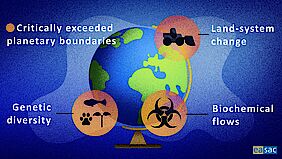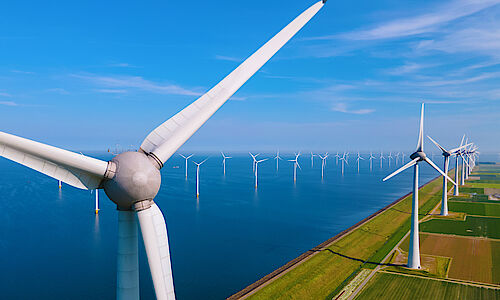News & Academies' activities
EASAC and IAP-The InterAcademy Partnership at COP26 in Glasgow
EASAC and IAP joined their ranks and presented their work on climate change in various events:
- Side Event 1: 01 November 2021 - Climate change and health in Europe: knowledge development and sharing efforts
This side event, organised with CICERO, the European Environment Agency and Women Leaders for Planetary Health, generated a lot of interest from both health care workers and European policy-makers alike. Although the pavilion was small and the venue was at capacity, additional interested parties were able to view the event digitally from outside the pavilion. There was high engagement within the room and from online, with many questions being asked and the conversation continuing after the event. Although online attendance of events was higher than at the venue, many COP participants reported issues with the platform and if it had been working more smoothly, attendance might have even been higher. The full EASAC reports were particularly popular during the event, showing a demand for detailed science-based evidence on multidisciplinary and global issues such as climate change and health. - Side Event 2: 05 November 2021 - The role of academies of science in Climate Change policy actions
This side event, organised by ASSAf (Academy of Science of South Africa) in a hybrid format, had limited in-person attendance with more engagement coming from online participants. Interest from health professionals was limited, despite word-of-mouth promotion. However, by this point in the conference the competition from other events had increased substantially. The audience seemed very interested in how academies contribute to policy-making through communicating key science-based messages, particularly on climate change and health. Due to the popularity of this topic, it seems that with some more strategic promotion, attendance could have been increased Side Event 3: 10 November 2021 - Climate action to protect and promote health: sharing knowledge among regions to focus on solutions
This event was organised together with ASSAf and the Royal Society. It generated high levels of interest throughout COP, particularly from health care workers. However, due to tough competition from other side events, the in-person attendance was limited. Despite low turnout, the audience was made up of health care professionals, NGO members and academicians and engagement from the audience was high. Questions related to how the science academies could continue to promote health through climate action and how they could partner with civil society and NGOs to produce more strategic communications. Overall, it seemed that the impact of this event was high, with tangible outcomes that included an offer to collaborate with Doctors Without Borders.Side Event 4: 12 November 2021 - Decarbonisation of Road Transport
This event was entirely virtual, but attracted over 130 participants and created a lively discussion, based on the presentations given by EASAC, The Potsdam Institute, ACEA and Peddle Smart.Overall Impression
COP26 presented a vital opportunity for EASAC and the European national academies of science to engage in ongoing and emerging climate discussions. The side events presented access to a wide range of stakeholders and attendance of experts from the academies generated a lot of interest in EASAC events. Actors from the health care sector and the NHS in particular expressed interest in engaging with EASAC directly. This indicates that if experts had been able to attend previous events or the conference for a longer period, EASAC’s impact on COP activities could have been higher. COP also presented new opportunities for collaboration, through both cooperation with other academic bodies when planning the side events and offers from attendees to cooperate on climate and health projects. However, careful timing of events and strategic communications are required to increase the scope of communication and to ensure the audience is not limited to actors from one sector. As the climate change and health topic is generating growing interest and importance in climate discourse, EASAC and the IAP’s potential contribution to COP27 could lie in further presentation of and engagement on the issue, and also continued collaboration with NASAC, for example on the topic of Decarbonisation of Transport.
Shayda Mollazadeh | 14 November 2021
Read also our Key Messages from European Science Academies for UNFCCC COP26 and CBD COP15 here: https://easac.eu/publications/details/key-messages-from-european-science-academies-for-unfccc-cop26-and-cbd-cop15/.
back to overview
































